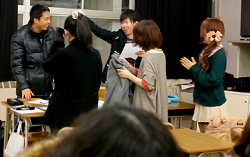Rewiring Through Learning

Your brain doesn’t just adapt—it can generate new cells and build new neural networks. This is called hippocampal neurogenesis, the process of generating new neurons in the brain’s hippocampus. This process persists into advanced age and supports memory and learning. Neurogenesis thrives when challenged by activities like studying, solving problems, working through stressful situations, or sports, as evidenced by studies showing increased neuron production and cognitive benefits (Spalding et al., 2013; Kempermann et al., 2022). Kurt Fischer’s work at Harvard’s Mind, Brain, and Education program supports this by emphasizing how cognitive challenges foster brain plasticity, the brain's ability to adapt, rewire, and learn throughout life. Put differently, neurogenesis is like planting seeds in a garden, nurtured by intellectual, social, physical, and spiritual engagement, and accelerated by challenge (Immordino-Yang et al., 2022).
Research confirms that adults can produce new neurons in the hippocampus, aiding memory and learning, a process known as adult neurogenesis (Spalding et al., 2013; Moreno-Jiménez et al., 2019). The hippocampus generates stem cells with the potential to become new brain cells. This process flourishes when you challenge your brain, such as by studying a new subject or practicing a sport, which sparks neuron growth much like planting seeds in a garden (Kempermann et al., 2022; Erickson et al., 2011).
Another key process is synaptic plasticity, where the connections between neurons (synapses) strengthen or weaken based on your experiences. A study by Song et al. (2023) showed that learning a complex skill, like coding or dancing, reshapes these connections, making your brain more adaptable. Think of it like upgrading your brain’s wiring: the more you practice, the stronger the connections become.
A critical point to consider: The dynamic nature of our brains thrives with conscious and deliberate effort. The adage "use it or lose it" holds true, validated by brain science. Active engagement preserves, strengthens, and expands the brain. The more we challenge our brains, the more they dynamically develop, strengthening connections and resilience. Conversely, a lack of learning increases vulnerability to decline over time. In other words, just as muscles atrophy without physical activity, the day we stop challenging and developing our brains is the day our brains start to decline.


![Your brain can keep growing, adapting, and learning at any age, if you are willing to put in the effort [Image: Copilot] Your brain can keep growing, adapting, and learning at any age, if you are willing to put in the effort [Image: Copilot]](/images/Images/best-years-for-adult-brain600.png)


![Your brain can keep growing, adapting, and learning at any age, if you are willing to put in the effort [Image: Copilot]](/images/Images/best-years-for-adult-brain300.png)

